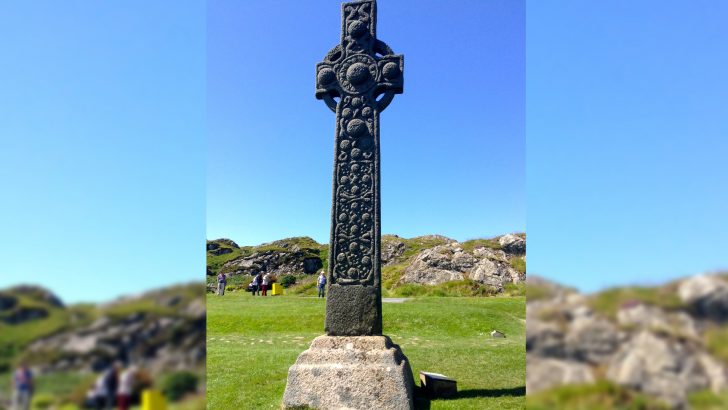Notebook
Irish people of all stripes are aware, at least vaguely, of the achievements of the learned monks of early Christian Ireland. Comparatively few details of the monastery schools and scholars on the island of Ireland at this period are known, however, and we know a good deal more about the Irish intellectuals who rose to prominence on the continent, under the patronage of Charlemagne and his successors.
One of these in particular deserves to be better known: a scholar by the name of Dicuil. He turns up in the historical record as a teacher of grammar at the Ninth Century court of Louis the Pious, Charlemagne’s son. We don’t know exactly where he was trained but he almost certainly spent some time at the great Irish monastery of Iona, and he specifically mentions voyaging around the islands off the north of Britain. Writing about these islands he says, “I have lived in some of them and I have visited others; some I have only glimpsed, while others I have only read about”.
Why was Dicuil, a teacher of grammar, writing about islands? Because he was also a pioneering geographer. He was skilled in astronomy, and wrote a very important treatise on the subject which is currently being translated by scholars at TCD, but he’s best known for a geographical work entitled, On the Measurement of the Sphere of the Earth. (Note that he, like every educated person in the Middle Ages, knew perfectly well that the earth is a sphere, not flat; the idea that medieval people all thought the earth was flat is an invention of the Nineteenth Century).
In his geographical work, Dicuil mostly gathers together classical sources, texts by ancient authors like Pliny the Elder and Solinus describing regions of the world to which Europeans at the time had little access: India, Africa, and so on.
Apart from transmitting ancient geographical authorities, Dicuil also adds contemporary geographical observations. He includes some fascinating detail about the geography of Egypt, told to him, probably on Iona, by a monk called Fidelis who had actually travelled to Egypt. Fidelis’ account includes accurate descriptions of the pyramids and other features of the landscape, and even the description of a canal from the Nile to the Red Sea, a precursor to the Suez Canal. This might seem fanciful, but we now know, from contemporary Arabic sources, that this ancient canal was in fact open and functioning for about a century in the early Middle Ages, so Dicuil’s source is once again accurate.
Dicuil has sources that went north too. He himself had travelled in the islands north of Britain, but he knows that some adventurous Irish monks sailed due north for several days until they reached uninhabited islands and built hermitages there. These islands are almost certainly the Faroe Islands, and the Irish monks were the first to visit and describe them, before abandoning the islands – and their sheep, Dicuil notes – when the Vikings attacked.
Iceland too was settled for the first time by Irish wanderers, and Dicuil hears from them about the phenomenon of the Midnight Sun around the summer solstice. Based on their descriptions he corrects some of what ancient writers had written, and he speculates – correctly of course – that at the winter solstice Iceland must be in perpetual twilight.
Dicuil doesn’t just correct ancient authorities, though, he also notes, with considerable humility, that many of the details in his work are uncertain, and he invites later readers to correct his text based on their own observations. It might be an exaggeration to call him a scientist, but he certainly had a keen scientific instinct, sharpened at the heart of a community of prayer and study somewhere on our island.
The early Irish Church and the life of the mind…
Another Irish monk on the continent – possibly even Dicuil himself – left behind a poem designed to encourage his pupils to spend their youth in study. It reveals beautifully the appreciation in the early Irish Church for the life of the mind:
Learn now, boys! The age for learning passes swiftly,
time goes by, as the heavens revolve the days follow.
Just as the swift charger gallops eagerly over the fields,
so youth flies by without lingering as it passes.
The pliant tip of the twig curves beneath an easy pressure
but no one can bend the stiff boughs.
While your minds happen to be receptive, my friends,
waste no time and learn the divine commands of God.
Do not squander the period generously granted to you,
for without learning the life of man perishes.



